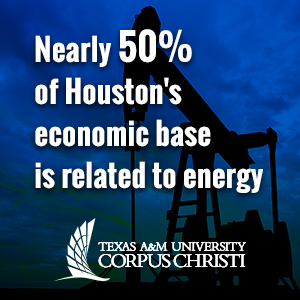
Houston is the biggest of all Texas oil boomtowns and is recognized as the “Energy Capital of the World.” The metropolitan area is a global hub for upstream and downstream oil and gas activities, as well as electrical and nuclear energy production. From oil rigs in the Gulf to inland hydraulic fracturing mines and petrochemical manufacturers on the outskirts of the city, the region is bursting with energy.
Accountants — always quick to seize opportunities — are taking advantage of specialized oil and gas accounting courses offered by some MBA programs to gain entry and influence in this industry.
For Accountants Who Want to “Be a Part of It”
Houston is to energy what New York is to theater, so it draws talented people from around the country and across the world who want to be a part of the energy scene. Nearly 50 percent of the region’s economic base (those sectors of the local economy that export goods and services outside the region) is related to energy. Approximately 5,000 energy-related firms are located in the Houston region, including 44 of America’s 200 largest publicly traded oil and gas exploration and production firms. The city is a member of the World Energy Cities Partnership and hosts the annual Offshore Technology Conference, which draws energy industry executives from around the world.
For Accountants Who Want to “Take a Slice of It”
The bigger the industry pie, the bigger the slices, and no one knows this better than accountants. Accounting professionals can find highly lucrative career opportunities in the energy sectors — if they have the unique knowledge and skill sets employers demand.
Consider how seven of these sectors rank among America’s top 50 highest-paying industries:
#20 Petroleum Refineries
#25 Natural Gas Liquid Extraction
#31 Petrochemical Manufacturing
#34 Pipeline Transportation of Refined Petroleum Products
#35 Nuclear Electric Power Generation
#39 Crude Petroleum and Natural Gas Extraction
#40 Pipeline Transportation of Crude Oil
What Does It Take to Make It in Energy?
Financial professionals in the oil and gas industry need to be fluent in the accounting, tax and regulatory matters relevant to the industry. Their employers need them to speak the industry’s language and to be proficient in using the preferred financial instruments and measurements. They need to understand the documents the industry uses, including authorization for expenditure and joint interest billing statements. Costs unique to the industry, such as intangible drilling costs (the costs incurred in drilling a well) and leasehold costs (associated with keeping a lease on a parcel of land) must become part of the accountant’s vernacular. At tax time, the accountant needs to understand the severance tax (on the removal of minerals from the ground) and the production tax (levied by the state on production).
An accountant or industry professional can learn all of this in the Texas A&M University-Corpus Christi Online MBA with a Concentration in Accounting. The program, which can be completed in as few as 12 months, offers core business courses and advanced accounting courses. The energy-specific course Oil, Gas & Energy Accounting is one of few offered in the United States. The course familiarizes students with the principles of upstream oil and gas operations; full cost pool accounting; accounting for production, exploration and construction; joint interest accounting; international operations; oil and gas taxation; and analysis of oil and gas financial statements.
For working professionals and accountants, this MBA program provides the necessary training to succeed in the region’s booming energy industry.
Learn more about Texas A&M University-Corpus Christi’s Online MBA with a Concentration in Accounting.
Sources:
Texas Monthly: The Evolution of the Energy Capital of the World
The Philosophical Society of Texas: Houston as the Energy Capital
